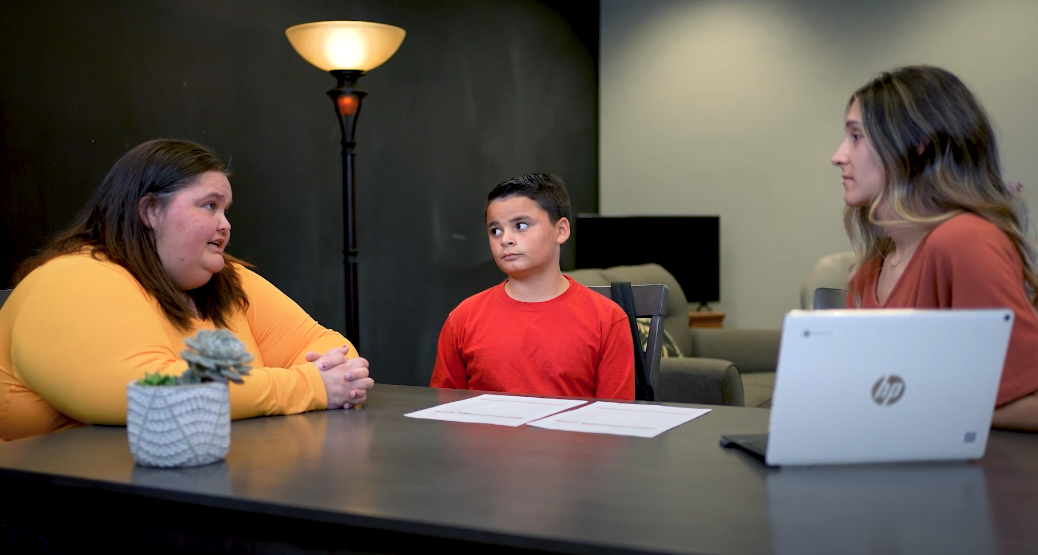Innovative Program Helps Youth in Foster Care Graduate High School & Live Their Dreams

Fostering Educational Success is a transformative program with a mission to support the educational endeavors of youth exiting foster care. What was the catalyst behind the program, and how does it continue to make a difference in the lives of those we serve? Get an inside look at KVC Nebraska’s Fostering Educational Success (FES) program and its impact on the youth and families we serve.
The Why Behind Fostering Educational Success
When the research team at the University of Nebraska-Lincoln studied a successful aftercare program for families in residential care, it sparked an idea. What if this model of care could be modified to serve other populations and bring about similar outcomes? Because of KVC Nebraska’s existing programs to support youth transitioning out of foster care, our organization became a partner with the research group on the grant application to extend our continuum of care.
FES Principal Investigator and Researcher Jacqueline Huscroft-D’Angelo specializes in FES research and data collection. “As researchers, we searched to see if there were similar programs,” Jacqueline explains. “Fostering Educational Success is the only multicomponent program that brings together agencies and schools to work toward educational outcomes. That’s what the U.S. Department of Education wants to see happen.”
Historically, the average high school graduation rate for youth in foster care is 55 percent. The adverse outcomes that youth in foster care may face after aging out can be even more challenging without a high school diploma. Not graduating high school can lead to underemployment, homelessness, trouble with the law, early pregnancy, poor health care and limited financial means.
 Fostering Educational Success is currently offered as part of a research program. Families enter the program voluntarily and complete surveys to help KVC Nebraska and our research partners continue improving the program. The main goals of the Fostering Educational Success program include:
Fostering Educational Success is currently offered as part of a research program. Families enter the program voluntarily and complete surveys to help KVC Nebraska and our research partners continue improving the program. The main goals of the Fostering Educational Success program include:
- Achieving and maintaining permanency
- Building academic engagement
- Achieving academic success
- Getting involved in extracurriculars or employment
- Exhibiting bonding, boundaries and monitoring
Fostering Educational Success is education-focused — but the classroom is only the beginning. The program also includes community involvement that helps participants feel connected and establish a sense of belonging that is critical to their wellbeing.
Inside the program’s Strengthening Families curriculum, participants improve family cohesion with an evidence-based, 11-lesson course with topics including communication, consequences, rules, drug and alcohol prevention and more. “We do that so they can be successful at home too,” says Family Coach Lindsay M. “There are so many components to being successful in education. It’s not just going to school. All of them work together and make a difference.”
The Program in Action: How FES Makes a Difference

Emily K., Fostering Educational Success Coach
FES Family Coaches work with families of many different permanency types, from reunification and guardianship to adoption and independent living. “We can really make a difference not only with the identified youth, but with the entire family,” says Family Coach Emily K. “We work with siblings too. They all get into the program.”
While meeting with a high school senior as part of her work as a Family Coach, for example, Emily helped establish a solid knowledge base about financial programs and scholarships. “They were surprised to know that only 3% of youth in foster care graduate from college,” Emily related. “I shared these statistics because he’s already enrolled in a community college. I told him, ‘You are part of raising that percentage.’” And that’s an outcome worth celebrating.

Lindsay M., Fostering Educational Success Family Coach
FES creates support for youth and their families. Family Coaches teach caregivers how to log into the school’s portal, check student grades and communicate with educators. Lindsay experienced the importance of this support when working with a caregiver reuniting with their child. “It’s been a lot of empowering the caregiver,” Lindsay shares. “For example, one caregiver’s first language is Spanish, so she lacked confidence in her ability to speak with the school and communicate over email. Our support included a lot of building her confidence and empowering her to be the one to reach out to the school.”
Ensuring caregivers have this crucial knowledge has a lasting impact — far beyond the current setting. “I’m working with a family right now that has other youth in foster care who have come to the home since another child started the program,” Emily relates. “I’ve been able to sit back and watch the caregiver utilize all the skills they’ve learned, from checking their grades to making sure school files are transferred and helping them apply for jobs or extracurricular activities. It’s been cool to see how caregivers are taking in what we’re teaching and using those skills even when we leave.”
The Positive Impact of Fostering Educational Success
“We want young people to be in school,” Jacqueline states. “School can do so many things. It builds self-efficacy, builds confidence, allows you to develop relationships and helps to establish your own identity.” For children involved in foster care, discovering this personal identity is key amid transition and turbulence.
The program doesn’t tell families what to do; rather, the Fostering Educational Success program empowers families with both rationale and tools to grow stronger together.
“We’re walking alongside them,” Jacqueline explains. “We’re showing them how and why. In our individual interviews with families that completed the program, the biggest theme was that FES connected the dots on why education is so important.”
As a Family Coach, Emily sees how supportive the FES program can be. “I hope we’re making an impact on keeping children placed in the home and having fewer disruptions when kids achieve permanency. We really support families during that time to help limit disruptions.”
Lindsay sees how FES affects more than just the child involved. “There’s a ripple effect for caseworkers, foster care specialists, the school and everybody else on the team who tries to pick up on the things that youth need support in, but can’t fill those needs. It’s alleviating some pressure and responsibility off those people by uplifting the youth and giving them as many team members as possible.”
How to Get Involved
Children from ages 7-19 years old can participate in the FES program as they attend school, have a history of foster care, are supported by a committed caregiver and live within 60 miles of Omaha or Lincoln. If you know a child who would benefit from the program, you can submit a referral here.
If you’re a caseworker, watch this video to learn about the Fostering Educational Success program from a former caseworker’s perspective.
As more families participate in this innovative program, the future of education for children in foster care change for the better. KVC Nebraska is proud to be a partner in researching how to support the academic efforts of children in foster care and offer life-changing resources to Nebraska families.
